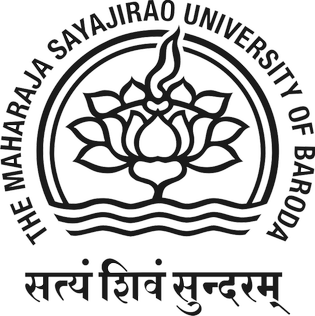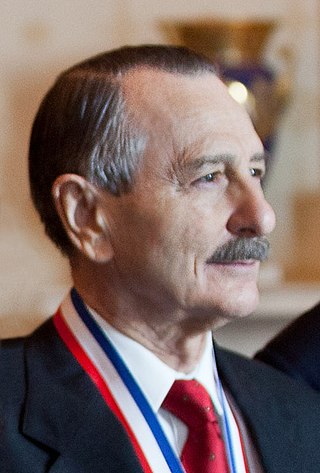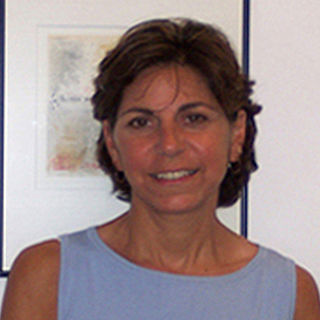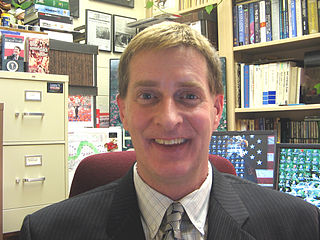Related Research Articles

Melvin Ellis Calvin was an American biochemist known for discovering the Calvin cycle along with Andrew Benson and James Bassham, for which he was awarded the 1961 Nobel Prize in Chemistry. He spent most of his five-decade career at the University of California, Berkeley.

The Maharaja Sayajirao University of Baroda, formerly Baroda College, is a public university in the city of Vadodara, in Gujarat state, India. Originally established as a college in 1881, it became a university in 1949 after the independence of the country. It was later renamed after its benefactor Maharaja Sayajirao Gaekwad III, the former ruler of Baroda State.
The Texas A&M University College of Science was the science college of Texas A&M University in College Station. The faculty includes a Nobel laureate and three National Academy of Sciences members. In 2006, the faculty collected a combined $38.5 million in peer-reviewed federal funding, and annually generates over $5 million in indirect cost return for Texas A&M.
Simon Asher Levin is an American ecologist and the James S. McDonnell Distinguished University Professor in Ecology and Evolutionary Biology and the director of the Center for BioComplexity at Princeton University. He specializes in using mathematical modeling and empirical studies in the understanding of macroscopic patterns of ecosystems and biological diversities.
J. Roger Porter was an internationally known microbiologist. Porter married Majorie Ann Perkins in 1934. He was the father of four children.

The College of Biological Sciences (CBS) is one of seven freshman-admitting colleges at the University of Minnesota. Established in 1869 as the College of Sciences, the College of Biological Sciences is now located across both the Minneapolis and the St. Paul campuses. The current interim dean is David Greenstein.
William Sharp is a biotechnologist and entrepreneur, who holds a PhD in plant cell biology from Rutgers University. He is well known for his application of science into business, creating both start up companies and extensive technology transfer experience across the Americas and Asia in a broad sector of business ventures.

Nina Vsevolod Fedoroff is an American molecular biologist known for her research in life sciences and biotechnology, especially transposable elements or jumping genes. and plant stress response. In 2007, President George W. Bush awarded her the National Medal of Science, she is also a member of the United States National Academy of Sciences, the American Academy of Arts and Sciences, the European Academy of Sciences, and the American Academy of Microbiology.

Ralph Lawrence Brinster is an American geneticist, National Medal of Science laureate, and Richard King Mellon Professor of Reproductive Physiology at the School of Veterinary Medicine, University of Pennsylvania.

Jack William Szostak is a Canadian American biologist of Polish British descent, Nobel Prize laureate, university professor at the University of Chicago, former Professor of Genetics at Harvard Medical School, and Alexander Rich Distinguished Investigator at Massachusetts General Hospital, Boston. Szostak has made significant contributions to the field of genetics. His achievement helped scientists to map the location of genes in mammals and to develop techniques for manipulating genes. His research findings in this area are also instrumental to the Human Genome Project. He was awarded the 2009 Nobel Prize for Physiology or Medicine, along with Elizabeth Blackburn and Carol W. Greider, for the discovery of how chromosomes are protected by telomeres.

The College of Natural Science (NatSci) at Michigan State University is home to 27 departments and programs in the biological, physical and mathematical sciences.

Diane L. Barber is an American cell biologist. She is an Endowed Professor and Chair of the Department of Cell and Tissue Biology at University of California, San Francisco (UCSF) and an elected American Association for the Advancement of Science fellow in recognition of her "distinguished contributions on cell signaling by plasma membrane ion transport proteins and on the design and function of proteins regulated by intracellular pH dynamics." In addition to teaching graduate and professional students and her administrative service, she directs a research laboratory funded by grants from the National Institutes of Health (NIH) and the National Science Foundation (NSF).

James Enderby Bidlack is a biologist. He is a professor of biology and CURE-STEM Scholar at the University of Central Oklahoma, president of Metabolism Foundation and vice president of The Genome Registry. Bidlack has co-written the textbook Introductory Plant Biology over several editions since its ninth edition. He also has been involved with the Repository for Germinal Choice, and appeared in a 2006 documentary about the project.

Richard A. Dixon is distinguished research professor at the University of North Texas, a faculty fellow of the Hagler Institute of Advanced Study and Timothy C. Hall-Heep distinguished faculty chair at Texas A&M University.
Beronda Montgomery is a writer, science communicator, and researcher. She recently moved to Grinnell College as vice president for academic affairs and dean of the college. Prior to Grinnell, Dr. Montgomery served as Michigan State University Foundation Professor in the Departments of Biochemistry & Molecular Biology and of Microbiology & Molecular Genetics. She was also a member of the MSU-DOE Plant Research Laboratory. Her research group investigates how photosynthetic organisms adapt to changes in their environment. Her scholarship extends beyond biology and into studying mentorship and faculty development to develop evidence-based strategies to foster equity and inclusion in academia. Together with Tanisha Williams and other members of the Black Botanists Week organizing committee, Montgomery co-founded and co-organizes Black Botanists Week.

The Leibniz Institute of Plant Biochemistry is a non-university, public research institute located in Halle (Saale), Germany. It carries out basic and applied plant research on model, cultivated and wild plants. Research activities at the institute include natural product chemistry, metabolism and protein biochemistry, cell and plant biology, as well as synthetic biology and biotechnology. The institute is a foundation under public law of the State of Saxony-Anhalt and is a member of the Leibniz Association.
Beate Schmittmann is a German-American condensed matter physicist and academic administrator who is dean of the College of Liberal Arts & Sciences at Iowa State University. Her research includes work on driven diffusive systems, biomolecular transport, and epidemiology.

John Z. Kiss is an American biologist known for his work on the gravitational and space biology of plants. Kiss is dean of the College of Arts & Sciences at the University of North Carolina Greensboro. Previously, he was a professor of biology and dean of the Graduate School at the University of Mississippi. and distinguished professor and chair of the botany department at Miami University. He has worked with NASA since 1987 and served as principal investigator on eight spaceflight experiments on the Space Shuttle, the former Russian space station Mir, and on the International Space Station. His research focuses on the sensory physiology of plants in space. He received the NASA Outstanding Public Leadership Medal in 2014. In 2021, Asteroid Kiss 8267 was named in his honor, a recognition that coincided with his receipt of the 2021 COSPAR International Cooperation Medal. His international collaboration on a spaceflight project with NASA and the European Space Agency has led to the discovery of novel sensory mechanisms in plants.
Alice Cheung is an American biochemist who is a Professor of Molecular Biology at the University of Massachusetts Amherst. Her research considers the molecular and cellular biology of polarization. She was elected a Fellow of the American Association for the Advancement of Science in 2020.
Helen Margaret Piwnica-Worms is an American cell-cycle researcher. Since 2013, she has served as vice provost of science at the MD Anderson Cancer Center and professor in MD Anderson's Department of Cancer Biology.
References
- ↑ "Diane Bassham". Iowa State University. Retrieved 22 December 2022.
- ↑ "Diane Bassham". Iowa State University Department of Genetics, Development, and Cell Biology. Retrieved 22 December 2022.
- ↑ "Growing a research legacy". Link. Vol. 11, no. 2. Iowa State University College of Liberal Arts and Sciences. 25 April 2022. Retrieved 22 December 2022.
- ↑ "Iowa State's Plant Sciences Institute awards innovative research grants". Iowa State University. 20 May 2005. Retrieved 22 December 2022. Alternate URL
- ↑ "Gamers on 3-D mission to save world, just don't tell them they are learning cell biology". Iowa State University. 2 February 2012. Retrieved 22 December 2022.
- ↑ "Diane Bassham named first recipient of Walter E. and Helen Parke Loomis Professorship of Plant Physiology at ISU". Iowa State University College of Liberal Arts and Sciences. 23 May 2013. Retrieved 22 December 2022.
- ↑ "Bassham selected by Faculty 1000". Iowa State University College of Liberal Arts and Sciences. 21 June 2017. Retrieved 22 December 2022.
- ↑ "Bassham named fellow". Iowa State University College of Liberal Arts and Sciences. 6 April 2020. Retrieved 22 December 2022.
- ↑ "World's largest science society honors six Iowa State researchers for distinguished work". Iowa State University. 26 January 2022. Retrieved 22 December 2022.
- ↑ "More than 60 faculty and staff honored with university awards". Iowa State University. 28 April 2022. Retrieved 22 December 2022.
- ↑ Schmittmann, Beate (11 May 2022). "May 11 message from Dean Schmittmann". Iowa State University College of Liberal Arts and Sciences. Retrieved 22 December 2022.